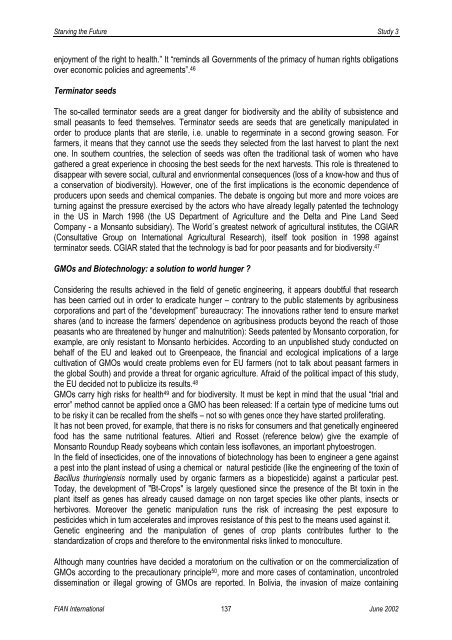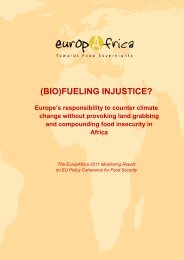Study 3: Ecodestruction and the Right to Food: The Cases of Water ...
Study 3: Ecodestruction and the Right to Food: The Cases of Water ...
Study 3: Ecodestruction and the Right to Food: The Cases of Water ...
You also want an ePaper? Increase the reach of your titles
YUMPU automatically turns print PDFs into web optimized ePapers that Google loves.
Starving <strong>the</strong> Future <strong>Study</strong> 3<br />
enjoyment <strong>of</strong> <strong>the</strong> right <strong>to</strong> health.” It “reminds all Governments <strong>of</strong> <strong>the</strong> primacy <strong>of</strong> human rights obligations<br />
over economic policies <strong>and</strong> agreements”. 46<br />
Termina<strong>to</strong>r seeds<br />
<strong>The</strong> so-called termina<strong>to</strong>r seeds are a great danger for biodiversity <strong>and</strong> <strong>the</strong> ability <strong>of</strong> subsistence <strong>and</strong><br />
small peasants <strong>to</strong> feed <strong>the</strong>mselves. Termina<strong>to</strong>r seeds are seeds that are genetically manipulated in<br />
order <strong>to</strong> produce plants that are sterile, i.e. unable <strong>to</strong> regerminate in a second growing season. For<br />
farmers, it means that <strong>the</strong>y cannot use <strong>the</strong> seeds <strong>the</strong>y selected from <strong>the</strong> last harvest <strong>to</strong> plant <strong>the</strong> next<br />
one. In sou<strong>the</strong>rn countries, <strong>the</strong> selection <strong>of</strong> seeds was <strong>of</strong>ten <strong>the</strong> traditional task <strong>of</strong> women who have<br />
ga<strong>the</strong>red a great experience in choosing <strong>the</strong> best seeds for <strong>the</strong> next harvests. This role is threatened <strong>to</strong><br />
disappear with severe social, cultural <strong>and</strong> envrionmental consequences (loss <strong>of</strong> a know-how <strong>and</strong> thus <strong>of</strong><br />
a conservation <strong>of</strong> biodiversity). However, one <strong>of</strong> <strong>the</strong> first implications is <strong>the</strong> economic dependence <strong>of</strong><br />
producers upon seeds <strong>and</strong> chemical companies. <strong>The</strong> debate is ongoing but more <strong>and</strong> more voices are<br />
turning against <strong>the</strong> pressure exercised by <strong>the</strong> ac<strong>to</strong>rs who have already legally patented <strong>the</strong> technology<br />
in <strong>the</strong> US in March 1998 (<strong>the</strong> US Department <strong>of</strong> Agriculture <strong>and</strong> <strong>the</strong> Delta <strong>and</strong> Pine L<strong>and</strong> Seed<br />
Company - a Monsan<strong>to</strong> subsidiary). <strong>The</strong> World´s greatest network <strong>of</strong> agricultural institutes, <strong>the</strong> CGIAR<br />
(Consultative Group on International Agricultural Research), itself <strong>to</strong>ok position in 1998 against<br />
termina<strong>to</strong>r seeds. CGIAR stated that <strong>the</strong> technology is bad for poor peasants <strong>and</strong> for biodiversity. 47<br />
GMOs <strong>and</strong> Biotechnology: a solution <strong>to</strong> world hunger ?<br />
Considering <strong>the</strong> results achieved in <strong>the</strong> field <strong>of</strong> genetic engineering, it appears doubtful that research<br />
has been carried out in order <strong>to</strong> eradicate hunger – contrary <strong>to</strong> <strong>the</strong> public statements by agribusiness<br />
corporations <strong>and</strong> part <strong>of</strong> <strong>the</strong> “development” bureaucracy: <strong>The</strong> innovations ra<strong>the</strong>r tend <strong>to</strong> ensure market<br />
shares (<strong>and</strong> <strong>to</strong> increase <strong>the</strong> farmers’ dependence on agribusiness products beyond <strong>the</strong> reach <strong>of</strong> those<br />
peasants who are threatened by hunger <strong>and</strong> malnutrition): Seeds patented by Monsan<strong>to</strong> corporation, for<br />
example, are only resistant <strong>to</strong> Monsan<strong>to</strong> herbicides. According <strong>to</strong> an unpublished study conducted on<br />
behalf <strong>of</strong> <strong>the</strong> EU <strong>and</strong> leaked out <strong>to</strong> Greenpeace, <strong>the</strong> financial <strong>and</strong> ecological implications <strong>of</strong> a large<br />
cultivation <strong>of</strong> GMOs would create problems even for EU farmers (not <strong>to</strong> talk about peasant farmers in<br />
<strong>the</strong> global South) <strong>and</strong> provide a threat for organic agriculture. Afraid <strong>of</strong> <strong>the</strong> political impact <strong>of</strong> this study,<br />
<strong>the</strong> EU decided not <strong>to</strong> publicize its results. 48<br />
GMOs carry high risks for health 49 <strong>and</strong> for biodiversity. It must be kept in mind that <strong>the</strong> usual “trial <strong>and</strong><br />
error” method cannot be applied once a GMO has been released: If a certain type <strong>of</strong> medicine turns out<br />
<strong>to</strong> be risky it can be recalled from <strong>the</strong> shelfs – not so with genes once <strong>the</strong>y have started proliferating.<br />
It has not been proved, for example, that <strong>the</strong>re is no risks for consumers <strong>and</strong> that genetically engineered<br />
food has <strong>the</strong> same nutritional features. Altieri <strong>and</strong> Rosset (reference below) give <strong>the</strong> example <strong>of</strong><br />
Monsan<strong>to</strong> Roundup Ready soybeans which contain less is<strong>of</strong>lavones, an important phy<strong>to</strong>estrogen.<br />
In <strong>the</strong> field <strong>of</strong> insecticides, one <strong>of</strong> <strong>the</strong> innovations <strong>of</strong> biotechnology has been <strong>to</strong> engineer a gene against<br />
a pest in<strong>to</strong> <strong>the</strong> plant instead <strong>of</strong> using a chemical or natural pesticide (like <strong>the</strong> engineering <strong>of</strong> <strong>the</strong> <strong>to</strong>xin <strong>of</strong><br />
Bacillus thuringiensis normally used by organic farmers as a biopesticide) against a particular pest.<br />
Today, <strong>the</strong> development <strong>of</strong> "Bt-Crops" is largely questioned since <strong>the</strong> presence <strong>of</strong> <strong>the</strong> Bt <strong>to</strong>xin in <strong>the</strong><br />
plant itself as genes has already caused damage on non target species like o<strong>the</strong>r plants, insects or<br />
herbivores. Moreover <strong>the</strong> genetic manipulation runs <strong>the</strong> risk <strong>of</strong> increasing <strong>the</strong> pest exposure <strong>to</strong><br />
pesticides which in turn accelerates <strong>and</strong> improves resistance <strong>of</strong> this pest <strong>to</strong> <strong>the</strong> means used against it.<br />
Genetic engineering <strong>and</strong> <strong>the</strong> manipulation <strong>of</strong> genes <strong>of</strong> crop plants contributes fur<strong>the</strong>r <strong>to</strong> <strong>the</strong><br />
st<strong>and</strong>ardization <strong>of</strong> crops <strong>and</strong> <strong>the</strong>refore <strong>to</strong> <strong>the</strong> environmental risks linked <strong>to</strong> monoculture.<br />
Although many countries have decided a mora<strong>to</strong>rium on <strong>the</strong> cultivation or on <strong>the</strong> commercialization <strong>of</strong><br />
GMOs according <strong>to</strong> <strong>the</strong> precautionary principle 50, more <strong>and</strong> more cases <strong>of</strong> contamination, uncontroled<br />
dissemination or illegal growing <strong>of</strong> GMOs are reported. In Bolivia, <strong>the</strong> invasion <strong>of</strong> maize containing<br />
FIAN International 137<br />
June 2002
















